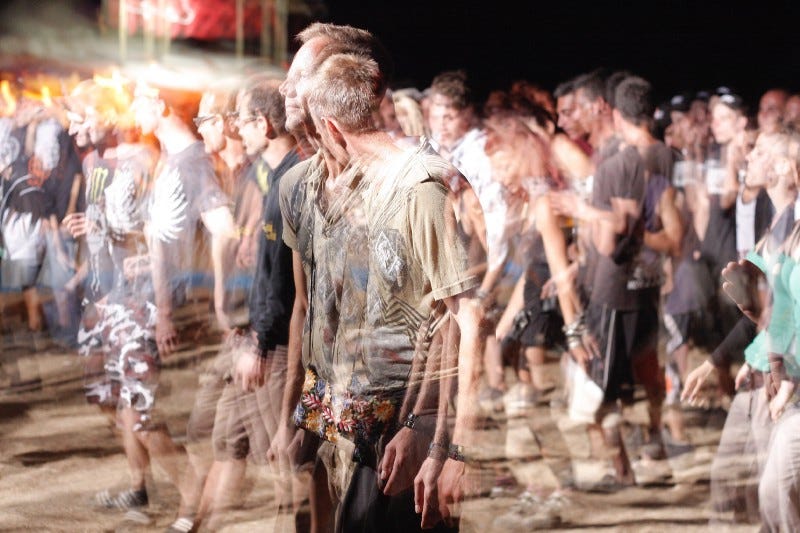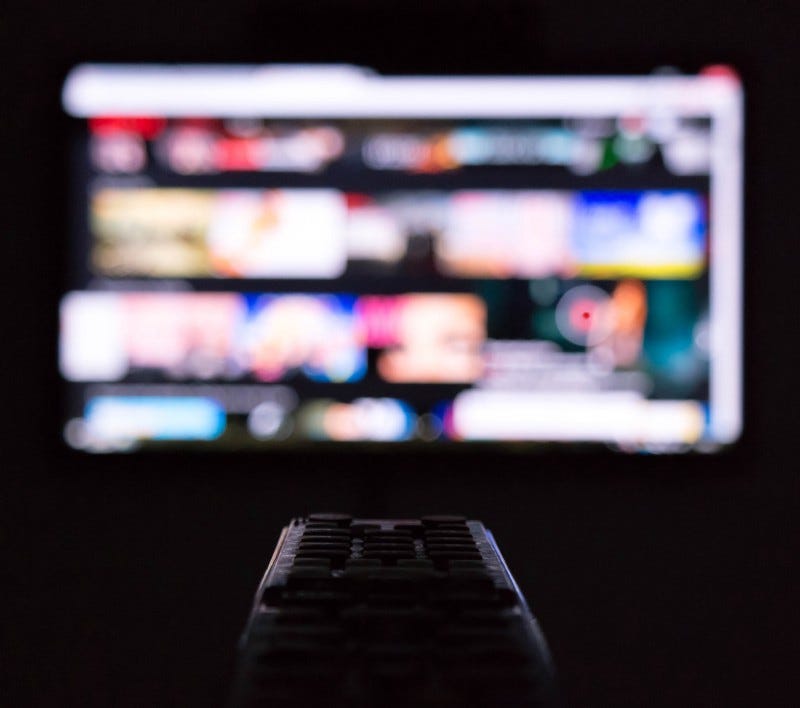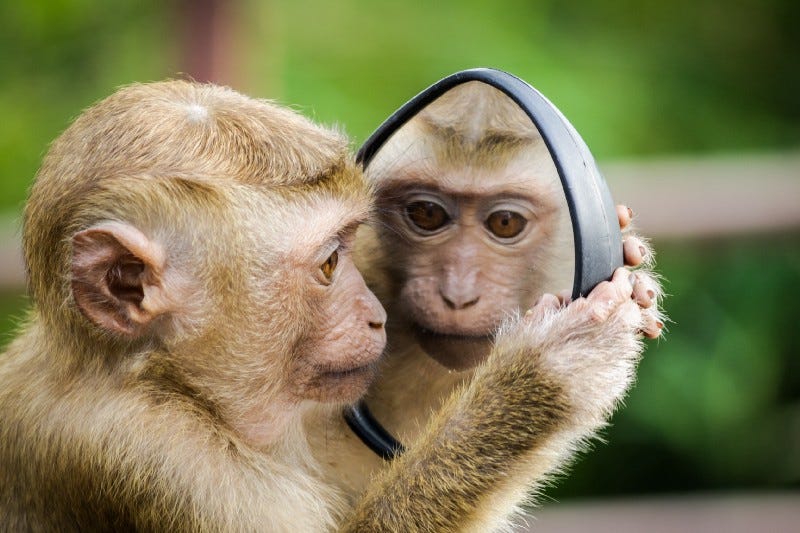The 3 Obstacles to Self-Knowledge
Happiness is not a goal you can pursue and reach, it’s a byproduct of living your life the right way.
Happiness is not a goal you can pursue and reach, it’s a byproduct of living your life the right way.
I stumbled upon this recently. And it hit me hard.
While “the right way” of course means different things for different people, it always depends on the choices you make.
The path of life is paved with choices.
But the thing is, if you don’t pay attention, you will sleepwalk through most of your choices and become a marionette of your environments.
And the big problem with this is that our environments are not built to help us get what we all want in life: health, happiness, meaning, and good relationships.
Think of the goals culture injected into us from a very early age. How the media and advertising industries play with our minds, how our food environments trigger us, and how different people can influence our feelings and thoughts.
Without proper self-knowledge, we will most likely blindly follow the signals that our environments set for us — almost by definition.
Without proper self-knowledge, we cannot carve out the path and make the choices that are truly meant for us.
But why aren’t we all investing into getting to know ourselves more all the time? Because it’s freakin’ hard. There are obstacles we need to overcome.
Obstacle #1: THE SOCIAL MIRROR
We use other people to assess ourselves. Everyone does that.
Why, though?
Because it’s easy.
It’s much easier to listen to what other people say about us or to observe how they react to us than it is to investigate the deeper layers of our own mind and develop an independent idea of who we are.
I don’t want to tell you that you should never pay attention to other people and how they view you. It seems to be pretty cool right now to tell everyone how you don’t care about what other people think of you because you are so independent.
Except that your urge to tell other people how independent you are is proof of that you are not.
But no one really is. And that’s okay.
We are social creatures and we are living together with other humans (and dogs). What we do and how we feel on a daily basis is at least in parts dependent on other people and our interactions with them.
It’s therefore no surprise that we are somehow wired to focus on how others receive us (quite literally — there are structures in our brains facilitating exactly that).
It can also be of great value to learn how other people see us because we are sometimes blind to certain aspects about ourselves. If you think of yourself to be this nice and awesome guy, but everyone who knows you keeps telling you that you’re kind of a dick — aren’t you maybe more dick-ish than you want to admit? Probably.
Or what if you’ve never thought of yourself as a creative person but all of your colleagues keep telling you how unique and original your approach to solving problems is. Maybe you actually are more creative than you think? Most likely.
So thinking that we shouldn’t give a damn about what other people perceive of as us might sound cool — but it’s bullshit. What we really shouldn’t do, however, is to let ourselves be limited by that.
But that’s exactly where the problem is: We usually do completely define ourselves by that.
“I am not who I think I am. I am not who you think I am. I am who I think, you think I am.” — Charles Cooley
Let that sink in for a moment.
We live in a perception of a perception of ourselves.
My identity is made up of what the people (my parents, friends, colleagues) around me think I should be or achieve.
The stories my environment tells me about myself is what I usually believe. Or better, my interpretation of the story they tell me.
Because it is so damn easy to just accept it and go with it.
If we really want to get to know ourselves, we must become better at detaching from what we think other people think about us.
Not because their views don’t matter, but because our focus on them can quickly dry out our own inner voice — which we so desperately need to learn to listen to in order to really understand the full complexity of who we are. And of who we are not.
Obstacle #2: DISTRACTION
We distract ourselves so we don’t have to deal with shit. We distract ourselves so we don’t have to be alone with our own minds. Because being alone with our own minds freaks us out. That’s why meditation is so hard for most people most of the time.
We use social media, Netflix, online shopping, sports, games, books, music, food, sex, drugs or alcohol to teleport our minds into a world that’s free of challenges, free of problems and free of discomfort.
And our environments make it very easy for us to do just that.
Just think about all of the different options you are constantly being presented with to distract yourself.
There is always something you can do, other than focusing on your own mind and what is going on inside it.
You can always stalk random people you don’t like or don’t even know on Instagram. Or watch yet another episode of your favorite TV show. You can always get a new tech gadget or another pair of jeans and have it delivered to you on the same day. There’s always another football highlight or best-of [fill in the blank] video waiting in for you in Youtube’s queue.
You can easily escape reality and dive into a fantasy novel — or listen to rappers talk about money, weed and bitches. You can always go to the kitchen and make yourself another sandwich even though aren’t hungry. Or you can just have a beer or a glass of wine to make yourself more comfortable — and to make everything around you just a little bit easier to bare.
Now, there’s nothing wrong with distraction per se. We can’t be focused all the time. We all need some sort of diversion.
The fucked up thing is, however, that we are just getting way too much of it, and that we usually don’t recognize how we’re constantly distracting ourselves.
Learning to become aware of our distractions, to choose them wisely and to resist them when necessary, is one of the major challenges towards more self-knowledge.
Obstacle #3: SELF-HONESTY
You know what feels shitty? Admitting to yourself how much you suck.
But seriously, we all suck. You suck, I suck, everyone you know somehow sucks. But here’s the cool thing: that’s okay.
Not only is it okay — it’s beautiful. Because our imperfections and our weaknesses make us human. They make this journey of life that we are all part of so much more interesting.
Our individual weaknesses are part of what makes everyone of us unique.
And yet, still, we don’t like to see it that way. Exploring our own weaknesses often creates a lot of discomfort. So we avoid it and rather come up with lies about ourselves that make us feel better in the moment.
We all do this, in many different ways.
We selectively pay attention to things that confirm our pre-existing beliefs (about ourselves). We distract ourselves with emotions that feel good from emotions that feel not so good.
And we are very good at finding explanations for why we are behaving in shitty ways. We quickly point the finger at our partner and how shitty they were to us. Or at the traffic we are stuck in. Or at the weather for not meeting our expectations.
What we usually don’t do is admit that we have our flaws and weaknesses that come out at times and make us behave in a shitty way.
For example, I have a tendency to feed my own ego through feelings of something like intellectual superiority. And this can lead to me shutting down other people’s differing opinions with overly aggressive arguments and judgments.
Ouch…
Do you think admitting this to myself was easy? Not at all. It took me a long time during which I had continuously been explaining away instances that should have made this fact obvious to me.
It certainly made it obvious to other people — and even alienated some of them. But I ducked away from really exploring this weakness of mine for so long because it felt pretty shitty as soon as I started.
So I lied to myself.
But now that I am aware of this tendency, I suck a bit less. And the conversations and controversial discussions I have with people have improved a lot. This doesn’t mean that this weakness of mine is gone. It simply means that I got better at handling it and not letting it run amok.
And that’s what it’s all about. Being honest to yourself can be very hard. But it doesn’t have to be.
Your increased self-awareness with regards to your own weaknesses should not result in making you feel more miserable.
It should not result in you telling yourself constantly how bad you really are. Because you aren’t.
Don’t let your self-awareness feed your self-judgment.
Rather, couple it to self-acceptance.
Again, we all suck. That’s the truth. Flaws and imperfections exist in everyone. And you are not a bad person for acknowledging them in yourself.
Quite the contrary, actually. In the Buddhist traditions, ignorance is seen as one of the three root causes of evil (besides greed and hate). And Plato allegedly viewed ignorance as “… the root and stem of all evil.”
Most people who act like assholes are usually pretty ignorant of their flaws and weaknesses.
They don’t accept them. Accepting yourself with all of your flaws is, I believe, a key to understanding others and their weaknesses better — and being more empathetic as a result.
Ultimately, being honest to yourself, and grounding that self-awareness in self-acceptance, will help you act more deliberately and more kindly, as well as to connect more to the people around you.
— —
THE END.
Thank you for reading this, I thoroughly appreciate it. If you want to support me, just click or tap (and hold) that clap button and share this story with the people you care about.
Much love,
Phil
📝 Read this story later in Journal.
🍎 Wake up every Sunday morning to the week’s most noteworthy stories in Wellness waiting in your inbox. Read the Noteworthy in Wellness newsletter.







